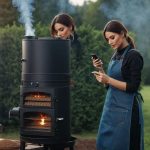Yes, it is hard to smoke in the rain, but not impossible.
Imagine you’re all set to smoke your favorite cut of meat, only to have your plans threatened by an unexpected downpour. Rain can be a significant obstacle for barbecue enthusiasts, making it tough to maintain that perfect smoky flavor. Here’s why smoking in the rain can be tricky and how you can overcome it:
- Maintaining Heat: Rain can lower the temperature of your smoker, making it challenging to keep the fire going.
- Moisture Control: Excess moisture from the rain can seep into your smoker, affecting the texture and taste of your meat.
- Wind and Rain: These elements can disrupt the airflow in your smoker, leading to uneven cooking.
But don’t let the rain dampen your barbecue spirit. With a few handy tips and tricks, you can still achieve delicious, smoky perfection even under a cloudy sky. From setting up a makeshift shelter to using weather-resistant equipment, there are numerous ways to tackle the challenges that come with smoking in the rain. Ready to learn how to master your smoker come rain or shine? Let’s dive in.
Contents
Is it Hard To Smoke In the Rain?
Smoking in the rain presents several challenges that can impact the success of your BBQ. These difficulties arise from environmental and equipment-related factors. Here’s a detailed look at what makes smoking in the rain tricky:
| Factor | Explanation | Solution |
| Temperature Control | Rain can cause the temperature inside the smoker to drop, making it difficult to maintain a consistent cooking temperature. | Use an insulated smoker or build a temporary shelter to protect the smoker from rain. Adjust the vents to control airflow and keep the temperature stable. |
| Moisture in the Smoker | Water can seep into the smoker, potentially putting out the fire and creating excess steam, which affects the smoking process. | Cover the smoker with a waterproof tarp or build a small shelter. Ensure the lid and vents are properly sealed to prevent water ingress. |
| Wet Wood Chips | Wood chips may become damp, producing less smoke and affecting the flavor of the meat. | Pre-dry the wood chips or store them in a dry place before use. Consider using an electric smoker, which can be less susceptible to moisture issues. |
| Airflow Disruption | Wind and rain can disrupt the airflow needed to keep the fire burning evenly. | Position the smoker in a wind-protected area and use windbreaks if necessary. Monitor and adjust the vents frequently to ensure proper airflow. |
| Personal Comfort and Safety | Standing in the rain for extended periods can be uncomfortable and increase the risk of slipping or other accidents. | Wear appropriate rain gear, including a raincoat and non-slip boots. Set up a covered area where you can stay dry while tending to the smoker. |
Smoking meat in the rain is indeed challenging but not impossible. With the right preparations and adjustments, you can still achieve a delicious BBQ despite the weather.
Risks of Using a Smoker in Wet Conditions
The potential risks or dangers associated with using a smoker in wet conditions are significant and multifaceted.
Electrical Hazards
| Risk | Description | Prevention |
| Electric Shock | Wet conditions can cause electric shocks when water comes into contact with the electrical components of the smoker. | Ensure proper grounding and use waterproof covers for electrical parts. Regularly inspect cords and outlets for damage. |
| Fire Hazard | Water can cause short circuits leading to fires. | Keep the smoker dry and shielded from rain. Use a weather-resistant smoker. |
Food Contamination
| Risk | Description | Prevention |
| Bacterial Growth | Moist conditions are ideal for harmful bacteria, which can contaminate the food. | Maintain a consistent smoking temperature and avoid opening the smoker frequently. Use a meat thermometer to ensure proper cooking temperatures. |
| Mold Growth | Prolonged exposure to wet conditions can lead to mold on the meat. | Store meat properly and keep the smoker covered when not in use. |
Structural Integrity
| Risk | Description | Prevention |
| Rust and Corrosion | Water exposure can cause metal smokers to rust, weakening their structure. | Use stainless steel or weather-resistant materials. Regularly clean and dry the smoker after use. |
| Malfunction or Collapse | Corrosion can lead to mechanical failures, potentially causing injuries or damage. | Regularly inspect and maintain the smoker, replacing any rusted parts promptly. |
Temperature Control
| Risk | Description | Prevention |
| Temperature Fluctuations | Wet conditions can cool the heating element, leading to inconsistent cooking temperatures. | Use an insulated smoker or a weather cover to protect against rain. Monitor temperature closely with a reliable thermometer. |
| Undercooked or Overcooked Meat | Temperature fluctuations can result in improperly cooked meat, affecting safety and taste. | Adjust cooking times as needed and verify internal temperatures before serving. |
How to Prepare Your Smoker
Preparing your smoker for use in the rain involves several key steps to ensure safety and maintain the quality of your smoked meats.
| Preparation Step | Description | Tip |
| Set Up in a Covered Area | Place the smoker under a canopy or in a covered area to protect from direct rain. | Use a sturdy canopy for effective shelter. |
| Clear the Area | Ensure the area around the smoker is free from obstacles and hazards. | Keep a dry mat nearby to avoid slipping. |
| Use a Water-Resistant Cover | Cover the smoker when not in use to protect it from rain. | Invest in a quality, water-resistant smoker cover. |
| Monitor the Fire Closely | Check and adjust the fire regularly to maintain heat. | Consider using an insulated smoker for better heat retention. |
| Have Dry Wood and Charcoal Ready | Store fuel in a dry place to ensure it burns properly. | Use waterproof containers for storage. |
| Keep the Vents Open | Ensure vents are open to maintain airflow and control temperature. | Regularly adjust vents to manage temperature fluctuations. |
Preparing Your Food for Smoking
To properly prepare your food for smoking and ensure the best results, even in rainy weather conditions, follow these detailed steps:
- Use Dry Wood: Always use dry, un-soaked hardwood for smoking. Wet or damp wood produces bad smoke, which can impart a bitter taste to your food and cools the smoking environment. Dry wood ensures a consistent temperature and produces light, flavorful smoke. Learn more about using wood chips.
- Dry Your Meat: Pat your meat dry before smoking. Moisture on the surface of the meat can hinder the formation of a good bark, which is the crusty exterior that adds to the flavor and texture. The Maillard reaction, responsible for this crust, requires a dry surface.
- Maximize Airflow: Ensure your smoker has proper ventilation. In rainy conditions, open vents help maintain good airflow, which is critical for consistent smoke and temperature control.
- Preheat the Smoker: Preheat your smoker to the desired temperature before adding the meat. This step is crucial to avoid temperature fluctuations that are more likely to occur in wet weather.
- Monitor Temperature: Use a reliable thermometer to keep track of the internal temperature of both the smoker and the meat. Rain can cool down your smoker quickly, so frequent checks are necessary to maintain the ideal smoking temperature.
- Shelter Your Smoker: Set up your smoker in a covered area to protect it from rain. Keeping your smoker dry helps maintain a consistent temperature and prevents moisture from affecting the cooking process.
- Use a Water-Resistant Cover: If you can’t find a covered area, use a water-resistant cover for your smoker. This helps keep the heat and smoke inside, ensuring better cooking results.
Choosing the Right Fuel and Wood
The ideal fuel and wood for smoking in the rain should ensure steady heat and consistent smoke, despite wet conditions. Here’s a comprehensive guide:
| Fuel Type | Description | Benefits |
| Charcoal Briquettes | Uniformly shaped pieces of charcoal made from compressed sawdust and other additives. | Long burn time, consistent heat, easy to light even in damp conditions. |
| Lump Charcoal | Natural chunks of charred wood. | High heat, burns cleaner, produces less ash, more authentic smoke flavor. |
| Propane | Gas fuel used in dedicated propane smokers. | Instant, adjustable heat, unaffected by rain, convenient. |
| Electric | Powered by electricity, used in electric smokers. | Precise temperature control, easy to use, not impacted by weather. |
When choosing wood for smoking in the rain, consider these options:
| Wood Type | Flavor Profile | Best For |
| Hickory | Strong, smoky, bacon-like flavor. | Pork, ribs, and red meat. |
| Mesquite | Intense, earthy flavor. | Beef and game meats. |
| Apple | Sweet, fruity flavor. | Poultry, pork, and fish. |
| Cherry | Mild, fruity flavor. | All meats, particularly chicken and turkey. |
| Pecan | Rich, sweet, nutty flavor. | Poultry, pork, and lamb. |
| Oak | Medium to strong smoky flavor. | All meats, versatile. |
| Alder | Delicate, slightly sweet flavor. | Fish and poultry. |
Maintaining Optimal Temperature and Smoke Levels
To maintain optimal temperature and smoke levels when smoking in the rain, follow these steps:
Choose a Sheltered Location
Find a spot under a roof, tree, or canopy. Alternatively, invest in a smoker’s tent or cover to protect your equipment from the rain.
Select the Right Fuel
Opt for electric or propane smokers as they are less affected by rain. If using wood or charcoal, ensure they are kept dry and consider a backup supply.
Inspect and Maintain the Smoker
Ensure all vents are clear of debris and water. Check for cracks or leaks that could cause heat loss. Cover the smoker with weather-resistant material to keep it dry.
Monitor Temperature Closely
Use a digital thermometer with probes. Insert probes into the meat and keep the main unit outside the smoker for accurate readings.
Manage Smoke Levels
Keep wood chips or pellets dry. Use a smoking tube or tray with dry pellets for consistent smoke. Have extra dry wood or chips on hand.
Check the Weather Forecast
Plan your smoking session according to the weather. Reschedule if heavy rain or thunderstorms are expected.
Cooking Tips and Tricks
Smoking food in the rain requires some extra preparation and vigilance to ensure your meal turns out perfectly. Here are some essential tips and tricks to help you master smoking in wet conditions:
Preparation and Setup:
- Check the Weather: Always review the forecast to anticipate the rain and choose a suitable location for your smoker.
- Cover and Canopy: Use a smoker cover or set up a canopy to shield your smoker from rain. Ensure there’s enough ventilation to prevent smoke from becoming trapped.
Temperature Management:
- Increase Temperature: Rain can cool your smoker. Compensate by setting the temperature slightly higher than usual.
- Monitor Closely: Keep a close eye on the temperature using a reliable thermometer. Rain can cause fluctuations, so frequent checks are vital.
Maintain Consistent Heat:
- Extra Fuel: Have additional fuel on hand to maintain a consistent temperature. Wet weather can cause your fuel to burn faster.
- Dry Storage: Keep your fuel dry and readily accessible to avoid interruptions during smoking.
Safety Precautions:
- Electrical Safety: Use a Ground Fault Circuit Interrupter (GFCI) for any electrical components to prevent hazards.
- Personal Protection: Use umbrellas or rain gear to protect yourself, especially your hands, when handling electrical equipment or hot surfaces.
Equipment Recommendations:
- Quality Smoker: Invest in a smoker with a tight-fitting lid and a built-in thermometer for more accurate temperature control.
- Meat Thermometer: Ensure meat is cooked to perfection by using a meat thermometer.
Enhancing Flavor:
- Humidity Benefits: Take advantage of the cool, humid air which can enhance the smoky flavor of your meat, offering a unique taste experience.
Cleaning and Storing Your Smoker

To properly clean and store your smoker, follow these steps to prevent damage and ensure it performs well, particularly in rainy weather:
| Step | Action | Details |
| Clean Interior | Use hot soapy water | Wipe with a sponge, damp cloth, or paper towel to remove grease and debris. |
| Clean Door Seal | Remove smoke residue | Use a cloth to clean the door seal to maintain a tight seal. |
| Clean Exterior | Wash with soapy water | Use a cloth to wipe down the outside surfaces. |
| Prevent Molding | Remove food residue | Wipe all surfaces with a clean cloth immediately after use. |
| Store Dry | Use a waterproof cover | Store in a dry place or use a waterproof cover if stored outside. |
| Inspect Regularly | Check for rust and wear | Address any issues promptly to prevent further damage. |
| Lubricate Parts | Apply cooking oil | Lubricate hinges and moving parts to prevent rust. |
By following these steps, you’ll keep your smoker in top condition, ready for use, and protected against the elements.
Conclusion
In conclusion, smoking in the rain may present some challenges, but it is not impossible. Factors such as maintaining heat, controlling moisture, and dealing with wind and rain can make it tricky to achieve that perfect smoky flavor. However, with a few handy tips and tricks, you can overcome these obstacles and still achieve delicious results. From setting up a makeshift shelter to using weather-resistant equipment, there are numerous ways to tackle the difficulties of smoking in the rain.
It is important to be aware of the potential risks associated with using a smoker in wet conditions, such as electrical hazards, food contamination, and structural integrity. Taking necessary precautions like proper grounding and regular maintenance can help prevent accidents or damage.
To prepare your smoker for use in the rain, it is essential to set up in a covered area or use a water-resistant cover. Additionally, choosing dry wood and maximizing airflow can help maintain consistent heat and smoke levels. When selecting fuel and wood for smoking in the rain, options like charcoal briquettes or lump charcoal are ideal for their ability to burn well even in damp conditions.
In summary, smoking in the rain may require some extra effort and preparation, but with the right techniques and equipment, you can still enjoy a delicious BBQ experience regardless of the weather.






